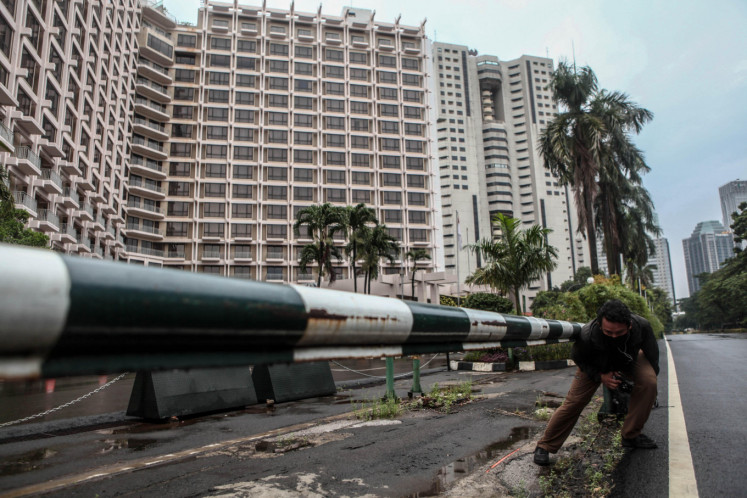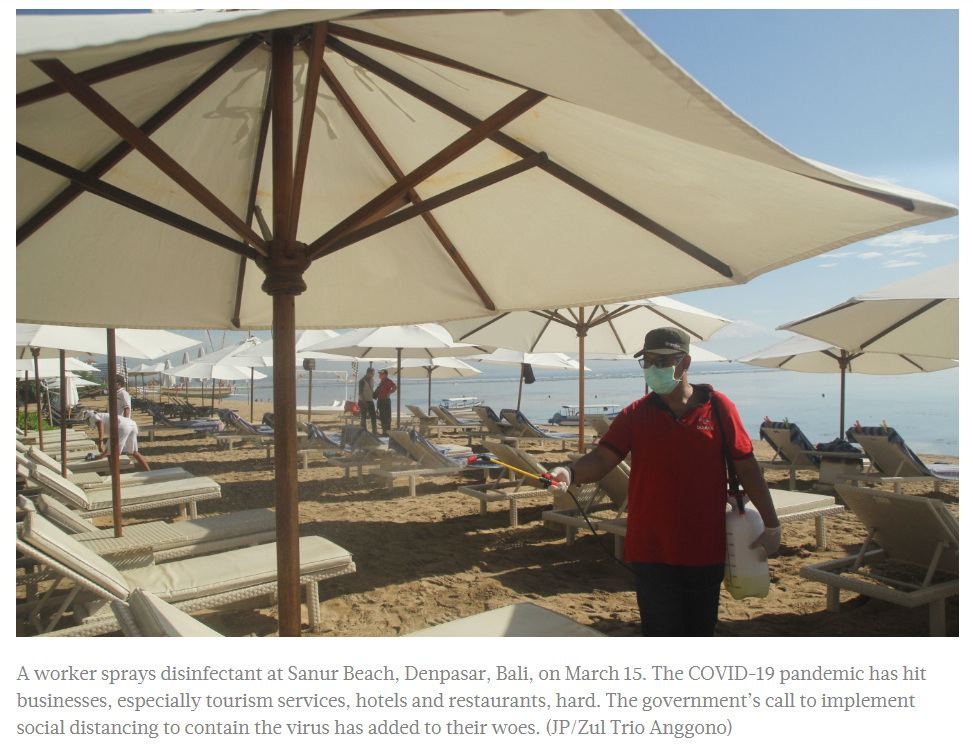Indonesia: Companies offer special packages, new services to entice virus-weary customers
Increasingly desperate businesses have come up with creative ideas to meet customers’ needs and weather the COVID-19 downturn.
Hospitality company Swiss-Belhotel International is offering a service it calls “Isolation Package in Indonesia”, where the hotel offers Wi-Fi, laundry and room service for those wanting to self-isolate during the pandemic. The rooms are being offered at a 35 percent discount from the normal price.
For a one month stay, the hotel chain offers a service called “Stay Longer, Stay Relaxed”, with cost starting from Rp 3,000,000 (US$191.25) in several hotels in Jakarta, Bali, and Surabaya, East Java.
“The [customers’] responses have been pretty good. We have received several inquiries because people need conducive places and hi-tech speedy wi-fi to work,” Swiss-Belhotel International group marketing and communications executive Cindy Margareth told The Jakarta Post recently.
Aryaduta Hotel Group, a Lippo Group company, also introduced a special program dubbed “Comfort in Self Isolation” in late March. The program, offered at prices starting from Rp 850,000, enables guests to self-quarantine for around 14 days and includes three meals per day, while ensuring that staff will not enter rooms and will not have direct contact with guests.
The COVID-19 pandemic has hit businesses, especially tourism services, hotels and restaurants, hard. The government’s call to implement social distancing to contain the spread of the virus has added to their financial woes.
Indonesian Hotel and Restaurant Association (PHR) chairman Hariyadi Sukamdani said 1,266 hotels had temporarily halted operation as of Wednesday due to the outbreak.
As citizens have been encouraged to stay home to flatten the curve of contagion, taxi operator Blue Bird has rolled out a special delivery service Blue Bird COD (Chat-Order-Delivery), which delivers items, such as groceries bought in a shop or documents, to and from customers using the company’s fleet.
The publicly listed company has worked with supermarkets and hotels to provide the new service. It is currently available in the Greater Jakarta area, Bandung, Semarang in Central Java, Surabaya in East Java and Bali, among other regions.
 A pedestrian walks in front of the Sultan Hotel, Jakarta, on April 9, 2020. The Indonesian Hotel and Restaurant Association said there were 1,266 hotels throughout Indonesia forced to temporarily close due to the spread of COVID-19. (JP/Seto Wardhana)
A pedestrian walks in front of the Sultan Hotel, Jakarta, on April 9, 2020. The Indonesian Hotel and Restaurant Association said there were 1,266 hotels throughout Indonesia forced to temporarily close due to the spread of COVID-19. (JP/Seto Wardhana)
“It cannot be denied that the company has been hit by the current situation, which, we feel, has also been experienced by other companies in other industries,” Blue Bird president director Noni Purnomo told the Post. “But on the other hand, this kind of uncertain situation also calls for us to develop our services.”
Before the pandemic, Blue Bird had seen a 31.21 percent decline in profit to Rp 314.5 billion last year from Rp 457.3 billion in 2018 as app-based ride-hailing services cleaved off swaths of its market share.
The transportation sector is one of the hardest hit in Indonesia. The Indonesian Chambers of Commerce and Industry (Kadin) noted that there had been a 50 percent revenue decline in the transportation sector since the country began experiencing COVID-19.
Kadin vice chairman of transportation Carmelita Hartoto projected the situation would worsen over the next six months, along with the extension of the “particular state of disaster emergency” declared by the government until the end of May.
“If the condition drags on and is prolonged, it is predicted that there will be many land transportation business players who will be out of work,” she said in a statement.
As of Tuesday afternoon, Indonesia had recorded more than 4,800 cases of COVID-19 with more than 450 deaths, official data shows.
Amid the health crisis, state-owned oil and gas company Pertamina expanded its existing Pertamina Delivery Service (PDS) to offer customers deliveries of oil, gas and lubricant. Previously, the service had only supplied its Bright Gas product.
The liquefied petroleum gas (LPG) delivery service is currently available in 89 cities and regencies, oil in 67 cities and regencies and lubricants in 10 cities and regencies.
“We’re continuing to expand the service areas,” Pertamina corporate communications vice president Fajriyah Usman said.
The newfound business strategies might help companies survive the pandemic, said Institute for Development of Economics and Finance (INDEF) economist Andry Satrio Nugroho.
“These are normal efforts to be made by any business to survive this kind of situation,” he said, adding that companies in the transportation sector should focus on logistics and delivery, as the service had been in demand.
He said smaller hotels would have difficulty offering work-from-home packages.
“The hotels that employ this strategy must have quite stable financial capabilities. [They are] often big hotels – four-star minimum – with hotel chains in many countries,” he said.
The government, Andry added, should focus its business incentives on manpower cost reduction by delaying state health insurance (BPJS) payments and lowering utilities bills.
Hariyadi of the PHRI expressed a similar view, saying that the hotels’ efforts might not be enough to increase the occupancy rate.
“What customers want to spend their money now? The packages are not always attractive because, now, consumers are holding back on spending money,” he said.
Source: https://www.thejakartapost.com/news/2020/04/15/companies-offer-special-packages-to-entice-virus-weary-customers.html


 Thailand
Thailand




